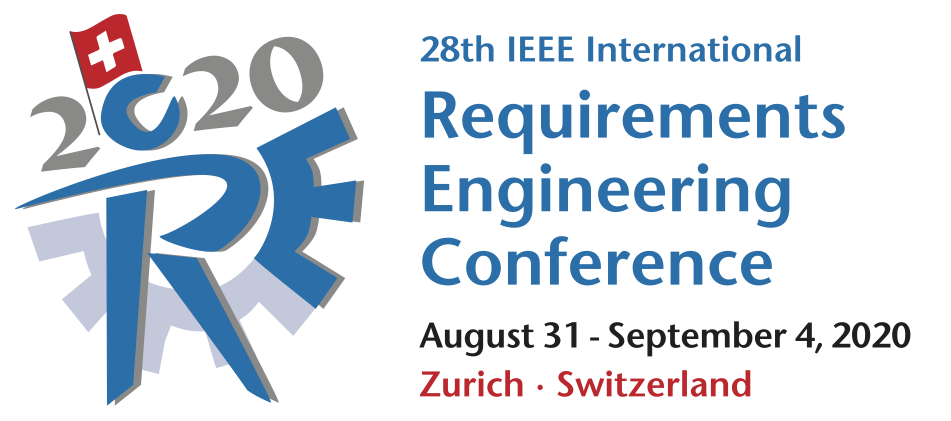Third International Workshop on Affective Computing in Requirements Engineering
A fully virtual workshop in conjunction with RE’20 on September 1, 2020.
Updates
June 30, 2020: The AffectRE'20 workshop will be fully virtual, while the RE'20 main conference will be held as a hybrid conference. June 24, 2020: The tentative program is online, which includes the list of accepted papers. May 19, 2020: The paper submission deadline is extended to May 29. New submissions are accepted, even after the abstract submission deadline. April 8, 2020: Please carefully read the main conference‘s statement "RE‘20 and Covid-19". In accordance to the RE'20 decision, the AffectRE'20 workshop will take place either in a hybrid or a remote format. This ensures that all paper authors will be able to present their work and participants can take part in the discussions whether or not traveling will be possible.Overview — Affective computing spans a broad research field from the recognition to the expression of emotions, which is of interest for software systems as they are designed and used by humans. For requirements engineering (RE), understanding and utilizing personality traits, attitudes, moods, and emotions play a crucial role in various facets, reaching from the consideration of individual professionals and team performance during RE activities to the utilization of end user emotions as a means to verify and validate requirements.
Goal — The AffectRE workshop aims at creating an international, sustainable community where researchers and practitioners can meet, present, and discuss their current work to affect the RE community with ideas from affective computing. In its third edition, this workshop fosters high-quality contributions about empirical studies, theoretical models, and tools that raise emotion awareness in RE.
Motivation
The awareness of emotions to be experienced by users is of utmost importance in RE. From requirements elicitation to negotiation, from modeling to prioritization, and from software design to implementation, different emotions arise and stakeholders' cognitive states evolve differently.
We want to shed a light on the emotions that accompany the users' acceptance of a system, which can be expressed through both implicit and explicit reactions. The sentiment expressed together with their opinions helps to assess important topics and creates actionable insights. Also, emerging techniques, products, and methods offer new ways of capturing emotional responses by users.
At the same time, being aware of the project mood and how affective states are reflected in communication style helps stakeholders improving teamwork which can have an impact on the output of RE activities. We need methods and artifacts that facilitate involving stakeholders in the activities of eliciting and modelling emotional requirements through appropriate approaches of participatory design. Moreover, it is increasingly important to understand emotions and affects to be experienced by people within sociotechnical systems where users are viewed as parts of the system and artificial intelligence increasingly blurs the distinction between humans and technology.
Topics of Interest
This workshop addresses affective computing in RE. Topics of interest include, but are not limited to:
- Automatic recognition and impact assessment of affective and cognitive states (affects, emotions, moods, attitudes, personality traits) on individual and group performance, commitment and collaboration in RE;
- Methods and artifacts for elicitation and modelling of emotional requirements, including the relevant approaches of participatory design (co-design);
- Leveraging stakeholders' affective feedback to improve requirements, tools, and processes (e.g., capture and analyze the sentiment of users and community feedback, aspect-based sentiment analysis of product reviews);
- Exploration of biometric sensors emerging from new (consumer) hardware which enable new measurement techniques to support the verification and validation of both functional and nonfunctional requirements;
- Interaction between RE and other software lifecycle activities, such as testing, from emotional and cognitive perspectives (e.g., in the communication between requirements engineers and testers);
- Design, development, and evaluation of frameworks and tools to support emotion and cognition awareness in RE;
- Defining or adapting psychological models of affect to RE (e.g., understanding the trigger behind positive and negative emotions during the requirement engineering process, modeling coarse vs. fine-grained emotion);
- Affective and cognitive state detection from the multimodal analysis of spontaneous communicative behavior, such as natural language, body postures and gestures, speech, or conversations;
- Sensing from communication artifact (e.g., message boards, social media) and techniques/tools for extracting and summarizing emotions from such channels;
- Interplay between affect and exogenous or endogenous workplace factors (e.g., physical location of the stakeholders, organizational hierarchy, adopted technologies);
- Emotion and cognition awareness in cross-cultural stakeholder teams (e.g., in global software development);
- Software frameworks, APIs, and patterns for designing and maintaining RE affect- and cognitive-aware systems (e.g., for integrating their sensing in requirements management tools).
Submission
We invite four types of contributions (all page limits include references):
- Full research papers (up to 6 pages) describe original work, such as novel approaches or frameworks, which are supported by initial validation results. Empirical evaluations and industrial experience reports are welcomed as well.
- Short position papers (up to 4 pages) describe a new idea or work in progress that is currently in an early development stage.
- Extended abstracts (up to 2 pages) outline a research project or newly developed tools, techniques or datasets, which must be supported by a poster on the workshop day.
- Promotional summaries (up to 2 pages) outline the use of established software or hardware for affective computing that may be new but of interest to the RE community. Authors should prepare an interactive presentation to promote and demonstrate why such software or hardware can be useful. This presentation should also contain a part that teaches how they can be used.
At least two members from the international program committee will review each submission. Papers will be evaluated based on their originality, relevance to the workshop, and their potential for discussion. The papers with the best reviews will be accepted to be presented in the workshop.
How to submit: All papers must be written in English, describe work that may not have been previously published, are currently not submitted elsewhere, and address at least one of the workshop topics of interest. The papers further must conform, at the time of submission, to the IEEE formatting instructions. Papers must be submitted electronically in PDF format using EasyChair.
Accepted papers will be submitted for publication in the IEEE Digital Library as part of the joint RE'20 workshop proceedings if at least one author registers for and presents their work at the workshop. Also, presenters are expected to attend and actively participate in the entire workshop.
Committees
If you have any questions, please do not hesitate to contact us using our email addresses available on the websites linked below, or contact us via social media.
Organization Committee

Kuldar Taveter
University of Tartu, Estonia
Website
Program Committee
- Bram Adams, Polytechnique Montréal (Canada)
- Raian Ali, Hamad Bin Khalifa University (Qatar)
- Muneera Bano, Deakin University (Australia)
- Rachel Burrows, Google (UK)
- Cristina Conati, The University of British Columbia (Canada)
- Fabiano Dalpiaz, Utrecht University (The Netherlands)
- Giuseppe Destefanis, Brunel University (UK)
- Davide Fucci, Blekinge Institute of Technology (Sweden)
- Eduard C. Groen, Fraunhofer IESE (Germany)
- Rashina Hoda, Monash University (Australia)
- Seok-Won Lee, Ajou University (Republic of Korea)
- Julio Cesar Leite, Pontifícia Universidade Católica do Rio de Janeiro (Brazil)
- Anas Mahmoud, Luisiana State University (USA)
- Daniel Martens, University of Hamburg (Germany)
- Antonette Mendoza, The University of Melbourne (Australia)
- Maleknaz Nayebi, Polytechnique Montréal (Canada)
- Nicole Novielli, University of Bari (Italy)
- Barbara Paech, Heidelberg University (Germany)
- Kurt Schneider, Leibniz University Hannover (Germany)
- Alexander Serebrenik, Eindhoven University of Technology (The Netherlands)
- Bonita Sharif, University of Nebraska - Lincoln (USA)
- Paola Spoletini, Kennesaw State University (USA)
- Leon Sterling, Swinburne University of Technology (Australia)
- Jordi Vallverdú, Universitat Autònoma de Barcelona (Spain)
- Didar Zowghi, University of Technology Sydney (Australia)
Important Dates
Deadlines are due at 23:59 AoE.
Abstract Submission: May 15 Optional
Paper Submission: May 22 → 29 Extended
Author Notification: June 22 Sent
Camera-Ready Submission: July 13
Workshop Day: September 1, 2020



